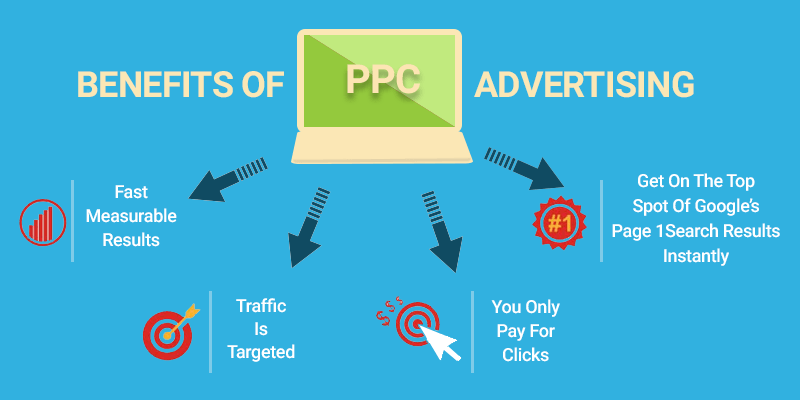Why is PPC Marketing Important for Businesses?
In today’s dynamic digital landscape, businesses are continually seeking effective ways to connect with their target audience and generate leads. Among various online strategies, PPC marketing emerges as a standout solution. Short for Pay-Per-Click, PPC marketing empowers businesses to showcase their ads on search engines, social media platforms, and other digital spaces, with costs incurred only when users click on the ads. This article delves into the critical role of PPC marketing in business growth and the measurable results it delivers.
What is PPC Marketing?

PPC marketing is an online advertising model where advertisers pay a fee for every click their ad receives. Unlike traditional forms of advertising, this method ensures that budgets are spent on users who demonstrate genuine interest in the product or service. Leading platforms such as Google Ads, Bing Ads, Facebook, and LinkedIn facilitate the execution of pay per click campaigns. These platforms enable businesses to refine their audience targeting using criteria such as keywords, demographics, and location, making Pay per click marketing a precise and impactful approach.
Why is PPC Marketing Essential?
1. Immediate Online Presence
One of the primary benefits of PPC marketing is its ability to provide instant visibility. Unlike SEO strategies, which take time to show results, PPC campaigns can position a business at the top of search engine results pages (SERPs) almost instantly. This is particularly advantageous for new ventures or those navigating competitive industries.
2. Targeted Audience Engagement
With PPC marketing, businesses can reach highly specific audiences. By selecting appropriate keywords, defining geographic parameters, and leveraging demographic filters, advertisers can ensure their ads reach the right users. For example, a local coffee shop could utilize PPC marketing to target individuals searching for “best coffee shops nearby.”
3. Cost Efficiency and ROI Optimization
Unlike traditional advertising, where costs remain fixed regardless of outcomes, PPC marketing ensures payments are made only for actual engagement. This results-oriented approach allows businesses to manage their budgets efficiently and achieve a higher return on investment (ROI). Analytics tools also provide actionable insights, enabling companies to evaluate campaign performance and refine strategies for maximum ROI.
4. Boosts Brand Visibilithttps://www.instagram.com/digitalprincechakravarti/y
Even when users don’t click on ads, PPC marketing enhances brand recognition. Frequent appearances in search results or on social media platforms contribute to greater familiarity and trust in the brand. Over time, this increased visibility can lead to higher conversion rates.
5. Complements Other Marketing Channels
PPC marketing integrates seamlessly with other strategies like SEO and content marketing. While SEO builds long-term organic growth, pay per click delivers immediate results. Together, they form a well-rounded approach to driving traffic and achieving conversions. For instance, businesses might leverage PPC marketing to promote time-sensitive offers while their SEO efforts bolster overall website visibility.
6. Data-Driven Campaign Insights
A significant advantage of PPC marketing is the wealth of data it provides. Metrics such as impressions, clicks, and conversion rates help businesses understand user behavior and optimize campaigns accordingly. These insights also inform broader marketing strategies, making PPC marketing a cornerstone of data-driven decision-making.
Core Components of a Winning PPC Marketing Campaign
To fully capitalize on PPC marketing, businesses should focus on the following elements:
1. Comprehensive Keyword Research
Identifying the right keywords is crucial for campaign success. Tools like Google Keyword Planner and SEMrush assist in discovering high-impact keywords that align with business objectives.
2. Crafting Persuasive Ad Copy
Engaging ad copy is key to attracting clicks. Highlight unique selling points, include a clear call-to-action (CTA), and ensure the content aligns with user intent.
3. Optimized Landing Pages
The landing page users visit after clicking an ad must be conversion-focused. Features such as clear messaging, fast loading speeds, and an intuitive layout contribute to higher success rates.
4. Strategic Budget Allocation
Set realistic budgets and monitor spending to ensure resources are utilized effectively. Platforms like Google Ads provide tools to adjust budgets based on campaign performance.
5. Continuous Performance Monitoring
PPC campaigns require regular evaluation to maintain effectiveness. Use analytics to track performance, test new variations, and fine-tune targeting parameters to enhance results.
Avoiding Common PPC Pitfalls
While PPC marketing offers substantial benefits, certain mistakes can hinder results. Common issues include:
- Overlooking Negative Keywords: These prevent ads from appearing in irrelevant searches, improving campaign focus.
- Ignoring Mobile Optimization: Mobile-friendly ads and landing pages are essential as more users browse on smartphones.
- Neglecting A/B Testing: Testing different ad formats and messages identifies the most effective approaches.
- Focusing Solely on Clicks: Success should be measured by conversions, not just clicks.
Conclusion
Pay per click marketing is a powerful strategy that can propel businesses toward their goals. Its capacity to deliver immediate results, engage targeted audiences, and offer measurable outcomes makes it indispensable for businesses of all sizes. By implementing a well-planned Pay per click marketing campaign, businesses can attract traffic, enhance brand visibility, and drive revenue growth. Start leveraging the potential of pay per click marketing today to stay ahead in the competitive digital landscape.
